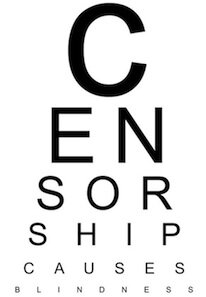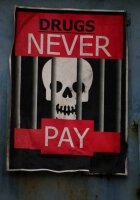Global censorship in the digital age
There is growing tension between free speech advocates and the increasing rate of global censorship. Organisations like Wikileaks and the Pirate Party are needed to counter censorship in order to promote human security and good government.
Technological advances during the last hundred years have given states a hard time forming or imposing a consensus within societies, without deploying some form of propaganda and censorship. This is especially true in modern democracies, as outlined by Noam Chomsky’s Manufacturing Consent. When the negative effects of these coercive state activities become more obvious, more people revolt and policies change. The Icelandic participation in the Iraq war is a perfect example.
As with the era of the printing press, the era of the internet will lead to fundamental changes in societies, starting with how much and how effectively we exchange and process information. The emergence of ‘pirate parties‘ all over the world, the spread of the popularity of independent online media and the increasing censorship of the spread of information on the global level all illustrate a new counter-establishment movement. This movement strives to remove internet censorship and promote human development and human rights through the freedom of information.
This becomes more and more apparent as states use censorship in one way or another. For example, Saudi Arabia banned the use of Blackberries because it was unable to decrypt the text messages sent by this type of mobile. The reason for this was that unlike every other mobile company, Blackberry was not routing SMS over the servers based in Saudi Arabia (which the government has control over) but rather encrypting them and sending them over a server in the US.
Modern technology is used by civil society to organize and exchange ideas, and authoritarian states have already lost some control over what type of information people in their country can access. Some examples are the protests in Tehran organised by social media in recent years, the growing online protests community in China and the underground news network that operates in Burma.
As past experiences reveal, democratic states also engage in the manipulation and censorship of information, not only in order to protect their own people, but also to protect the interest of certain influential groups. These groups, if left alone, can grow to proportions where a democratic state develops something called a shadow state. Examples of this can be found in the wiretapping of Americans which have being going on since the 1970s, and growing online censorship in Germany and other states. These lists of censored sites become a tool for the censorship of ideas and the freedom of speech, as when the Australian government censored Wikileaks.
Therefore, it is worthwhile analysing the young political counter-culture which tries to highlight and fight against this growing form of censorship globally. As an uncoordinated movement, it is united by an ideology, trying to seal the leak within democracies that allows interest groups such as global operating corporations and interstate organisations like NATO push for illegitimate policies.
In the political realm, this movement is embodied by pirate parties, prevalent all over the world, although the movement’s ideological birthplace lies in Europe. The case of Pirate Bay in Sweden, the Chaos Computer Club, and the emergence of the green movement are all points of reference for people who stand close to the pirate parties, because they all have a global approach towards human security problems and are part of an evolving global civil society.
Furthermore, they are points of reference for free speech activists who believe that human rights trump copyright and patent laws if the information or ideas conveyed are significant for the welfare of humanity. The exponential growth of digital information, in addition to the digitalisation of tradition media, increases the individual human potential, especially in developing countries.
Therefore, fighting for the reform of the patent system and creating as much freedom of information as possible in one’s own country allows a natural drive towards sustainable economic development. Indeed, corporate espionage is done by many companies regardless of their origin, as recent reports about French and other nation’s companies demonstrate.
International development is especially hindered by the patent and copyright system. The economic power of the west is today symbolised by ‘outsourced’ pollution, and the ability of western pharmaceutical companies to copyright the genetic features of indigenous plants coming from the poorest places.
According to a board member of the Pirate Parties International, Gregory Engels, more than 30 national pirate parties collectively share the goal to reform and globalise national copyright and patent systems. The mutually beneficial system they propose would help aid economic development as well as improve the global security situation, as Engels stressed in his interview with The Vibe.
Another organisation which is part of the counter-culture is Wikileaks. As questionable as certain leaks are, looking at Wikileaks’ revelations in their entirety one would see a global and international agenda that strives towards transparency. From a purely human rights point of view these leaks reveal abuses which will enable people all over the world to pass on this information resulting in a change of perception. In addition, this might result in a change of policy as well.
Certainly, Wikileaks is not the first organisation which spreads censored information in the public interest to the people, but it is the first platform which has an international reputation for leaking original documents for the interest of a global public. Therefore, it comes as no surprise that groups within this counter-movement work together. For example, the pirates all over the world helped to set up mirrors for Wikileaks so the site will never go down again. People demonstrated in front of the Old Bailey when Assange was in Jail, while others illustrated the media’s manipulative coverage of the Wikileaks affair with growing public attention.
This international response to Wikileaks is growing and can be regarded as an emerging digital counter-culture, in which The Daily Show is the most watched TV news show and real information comes from independent online media. In this culture, George Orwell’s 1984 is the bible, and the digital void is the immortal prophet. The veterans of this movement are people who cheated telephone companies to talk to friends on the other side of the world and those who originated the word ‘hack’.
Nowadays hackers have to be ever more ingenious to be able to create a tool as powerful as, for example, the ‘Orbital Cannon’ which bombarded the Visa and Paypal website with requests, or to engineer a system where people are able to leak highly confidential information to the rest of the world in complete anonymity.
It is fair to assume that the pirate movement is gaining greater public legitimacy and that their tools of protests, their expertise and their influence will grow accordingly; indeed, one new national pirate party created every two weeks, according to Gregory Engels. This will lead the establishment to react as it has already done in the case of the Pirate Bay.
In the end, there will likely be the choice between the total regulation of the internet, meaning that every byte of information is dealt with according to the potential threat the information poses, or the establishment of a somewhat free form of digital network, in which the freedom of speech and the freedom of information are founding principles.











